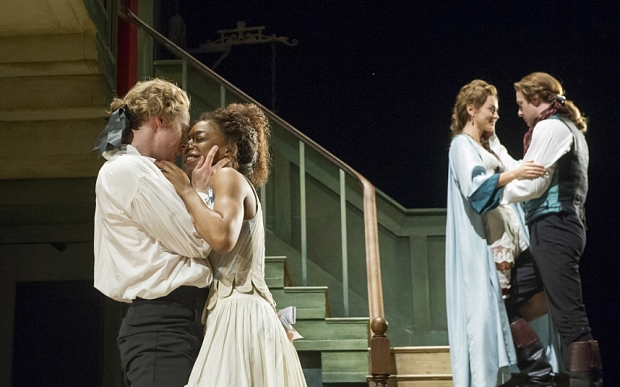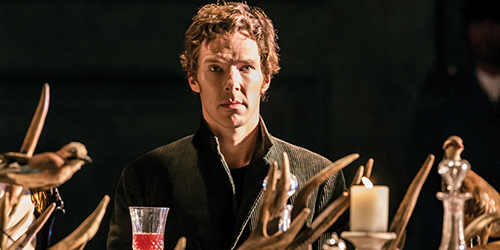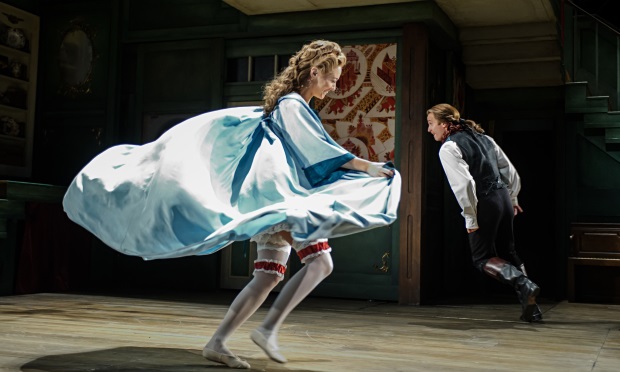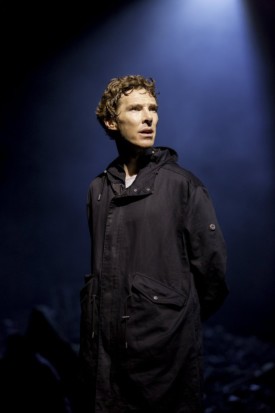If proof were needed of the sheer variety in the transatlantic fare served up by the National Theatre’s NT Live, we’d need to look no farther than the next two offerings in that stage-to-screen series coming to the Amherst Cinema. One is a classic Restoration comedy in which social commentary mixes freely with romantic shenanigans. The other is Hamlet.
Once you’ve got your head around the archaic title, The Beaux’ Stratagem (beaux, as in stylish young gentlemen, plural possessive; stratagem, as in devious scheme) unfolds as a country-house romp, but with an edgy twist. George Farquhar’s 1707 play was his last work and one of the last Restoration comedies, written as the free-wheeling and to some extent free-thinking English theater of the late 17th century was giving way to more strait-laced manners and morals.
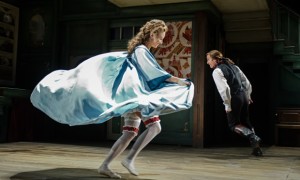 Here, two fashionable young bucks, having squandered their fortunes and fearing the scorn of London society, flee the city for the more innocent (they think) countryside. There, they hope to “wive it wealthy,” as another fortune hunter once put it, and snare a rich heiress or two.
Here, two fashionable young bucks, having squandered their fortunes and fearing the scorn of London society, flee the city for the more innocent (they think) countryside. There, they hope to “wive it wealthy,” as another fortune hunter once put it, and snare a rich heiress or two.
Aimwell and Archer (their names, like others’ in the cast, serve as character descriptions as well as monikers) arrive at a country estate headed by one Lady Bountiful, whose family includes a fetching daughter, Dorinda, and a sottish son, Sullen. The son’s wife, Kate, is more than attracted to Archer and happy to divorce Sullen, if only she could – incompatibility not being legal grounds for divorce in those days. Aimwell, meanwhile, goes beyond the beaux’ scheme and actually falls in love with Dorinda.
Farquhar’s satirical view of marriage-as-subjugation, with his evident approval of Kate’s desire for liberation, was hot stuff at the time, and it lends an edge to the plot’s farcical turns. The production, set in the National Theatre’s spacious Olivier Theatre and directed by Simon Godwin (who most recently staged another jaundiced look at the marital institution, Shaw’s Man and Superman), fills the stage with period costumes, Irish dancing and frantic action intersecting the dialogue’s witticisms. The Guardian called it “an exhilarating revival [that] maintains a perfect balance between serious comment and exuberant fun.”
It plays this Saturday at 1 p.m. at the Amherst Cinema.
There’s not much to be said about next week’s NT Live premiere that can’t be distilled into four words: Benedict Cumberbatch as Hamlet.
The man who made even the Holmes-weary among us newly spellbound in the BBC’s Sherlock, then transfixed us in his dual-role Frankenstein via NT Live, and who seems to turn up in every other movie these days,
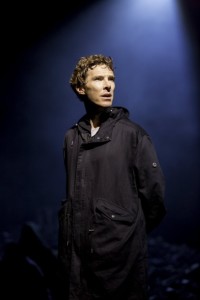 including his Oscar-nominated performance in The Imitation Game, now takes on drama’s most coveted role. The production sold out on his name alone long before it opened for a limited run in August. It closes this month, but not before an NT Live broadcast from London’s Barbican Centre next Thursday, followed by a half-dozen repeat screenings in Amherst over the next two months.
including his Oscar-nominated performance in The Imitation Game, now takes on drama’s most coveted role. The production sold out on his name alone long before it opened for a limited run in August. It closes this month, but not before an NT Live broadcast from London’s Barbican Centre next Thursday, followed by a half-dozen repeat screenings in Amherst over the next two months.
A frenzy of media excitement and speculation dominated the run-up to opening night, and director Lyndsey Turner’s cuts and shifts in the text generated enough controversy in the early previews that her first idea – opening the show with Act Three’s “To be or not to be” – was scrapped in favor of an equally unorthodox beginning: Hamlet in jeans, paging through his dead father’s scrapbook while listening to Nat King Cole crooning “Nature Boy.”
The British press generally praised the production’s audacity and the lead’s performance: “… a fresh, dynamic staging with a vivid, supple performance at its heart … staged with stately pomp and madcap flourish … a radical reinvention with real political intent … Cumberbatch stands equal to the best modern Hamlets, makes the part his, and yes, justifies the hysteria.”
’Nuff said.
If you’d like to be notified of future posts, email StageStruck@crocker.com

